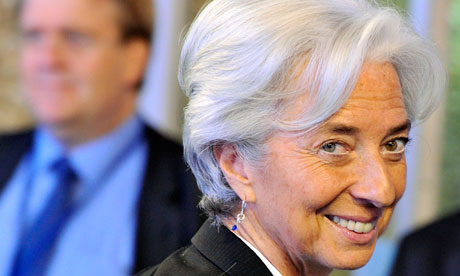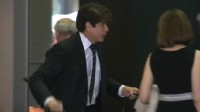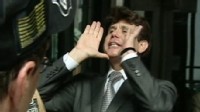NATO helicopters end Kabul hotel siege, at least 7 dead
An Afghan army officer mans a heavy gun mounted to a vehicle at the entrance to the Inter Continental hotel, which came under attack in Kabul, Afghanistan, Wednesday, June 29, 2011. (AP / Gemunu Amarasinghe)
The Associated Press
Date: Tue. Jun. 28 2011 11:04 PM ET
KABUL, Afghanistan — vInterior Ministry spokesman Sediq Sediqqi said six suicide bombers attacked the Inter-Continental hotel frequented by Afghan officials and foreign visitors. He said two were killed by hotel guards at the beginning of the attack and four others either blew themselves up or were killed in the airstrike or by Afghan security forces.
The Taliban claimed responsibility for the rare, nighttime attack in the capital -- an apparent attempt to show that they remain potent despite heavy pressure from coalition and Afghan security forces.
The attackers were heavily armed with machine-guns, anti-aircraft weapons, rocket-propelled grenades, hand grenades and grenade launchers, the Afghan officials said. Afghan police rushed to the scene and firefights broke out. They battled for hours with gunmen who took up positions on the roof.
Some Afghan provincial officials were among the 60 to 70 guests staying at the hotel.
Abdul Zahir Faizada, who is head of the local council in Herat province in western Afghanistan, was staying at the hotel. He planned to attend a conference in Kabul on Wednesday to discuss plans for Afghan security forces to take the lead for securing an increasing number of areas of the country between now and 2014 when international forces are expected to move out of combat roles. Afghans across the country were in the city to attend.
"We were locked in a room. Everybody was shooting and firing," said Faizada who was staying at the hotel with the mayor of Herat city and other officials from the province. "I heard a lot of shooting."
Deputy police chief in Kabul, Daoud Amin, said seven people died in the attack and eight other people -- two policemen and six civilians -- were wounded. The attackers are not counted in that death toll.
Nazar Ali Wahedi, chief of intelligence for Helmand province in the south, called the assailants "the enemy of stability and peace" in Afghanistan.
Wahedi, too, was in town to attend Wednesday's transition conference, which was being held at a government building in the capital.
"Our room was hit by several bullets," Wahedi said. "We spent the whole night in our room."
The attack began around 10:30 p.m. local time Tuesday and ended around 3 a.m. Wednesday.
U.S. Army Maj. Jason Waggoner, a spokesman for the U.S.-led coalition fighting in Afghanistan, said the helicopters fired on the roof where militants had taken up positions. He said they killed three gunmen and that Afghan security forces clearing the hotel worked their way up to the roof and engaged the remaining insurgents.
As the helicopters attacked and Afghan security forces moved in, four massive explosions rocked the hotel. Officials at the scene said the blasts occurred when security forces either fired on suicide bombers or they blew themselves up.
After the gunmen were killed, the hotel lights that had been blacked out during the attack came back on. Afghan security vehicles and ambulances were removing the dead and wounded from the area.
Taliban spokesman Zabiullah Mujahid quickly claimed responsibility for the attack in a telephone call to the AP, then later issued a statement claiming that Taliban attackers killed guards at a gate and entered the hotel.
"One of our fighters called on a mobile phone and said: 'We have gotten onto all the hotel floors and the attack is going according to the plan. We have killed and wounded 50 foreign and local enemies. We are in the corridors of the hotel now taking guests out of their rooms -- mostly foreigners. We broke down the doors and took them out one by one."'
The Taliban often exaggerate casualties from their attacks. The statement did not disclose the number of attackers, but only said one suicide bomber had died.
A few hours into the clashes, an Afghan National Army commando unit arrived at the scene.
Initially, the U.S.-led military coalition said the Afghan Ministry of Interior had not requested any assistance from foreign forces. But later, the NATO helicopters arrived on the scene at the hotel on a hill overlooking the capital.
Guests inside the hotel said they heard gunfire echoing throughout the heavily guarded building.
Jawid, a guest at the hotel, said he jumped out a one-story window to flee the shooting.
"I was running with my family," he said. "There was shooting. The restaurant was full with guests."
The attack occurred nearly a week after President Barack Obama announced he was withdrawing 33,000 U.S. troops from Afghanistan and would end the American combat role by the end of 2014.
Before the attack began on Tuesday, officials from the U.S., Pakistan and Afghanistan met in the capital to discuss prospects for making peace with Taliban insurgents to end the nearly decade-long war.
"The fact that we are discussing reconciliation in great detail is success and progress, but challenges remain and we are reminded of that on an almost daily basis by violence," Jawed Ludin, Afghanistan's deputy foreign minister, said at a news conference. "The important thing is that we act and that we act urgently and try to do what we can to put an end to violence."
The Inter-Continental -- known widely as the "Inter-Con" -- opened in the late 1960s, and was the nation's first international luxury hotel. It has at least 200 rooms and was once part of an international chain. But when the Soviets invaded Afghanistan in 1979, the hotel was left to fend for itself.
It was used by Western journalists during the U.S.-led invasion of Afghanistan in 2001.
On Nov. 23, 2003, a rocket exploded nearby, shattering windows but causing no casualties.
Twenty-two rockets hit the Inter-Con between 1992 and 1996, when factional fighting convulsed Kabul under the government of Burhanuddin Rabbani. All the windows were broken, water mains were damaged and the outside structure pockmarked. Some, but not all, of the damage was repaired during Taliban rule.
More 






 6/30/2011 03:38:00 AM
6/30/2011 03:38:00 AM
 live news
live news




































